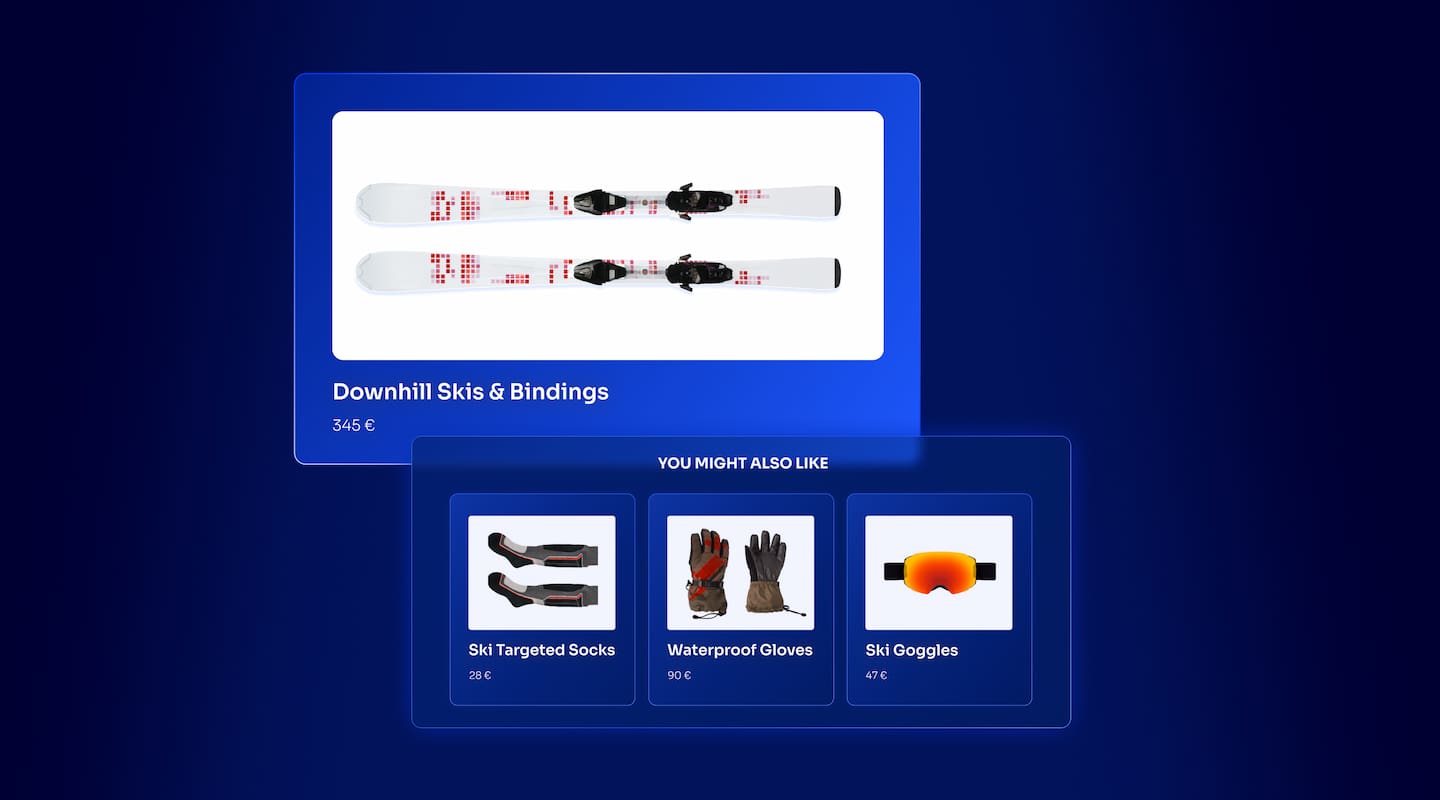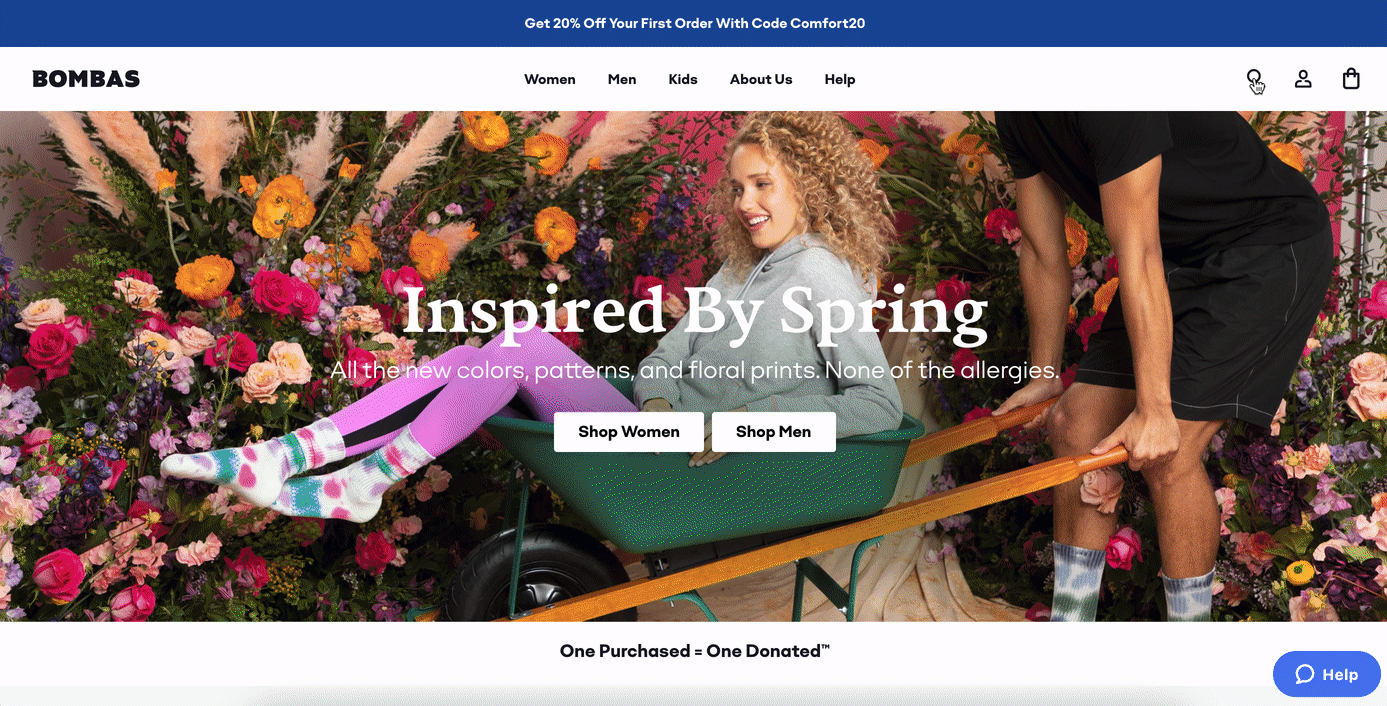Add InstantSearch and Autocomplete to your search experience in just 5 minutes
A good starting point for building a comprehensive search experience is a straightforward app template. When crafting your application’s ...
Senior Product Manager


A good starting point for building a comprehensive search experience is a straightforward app template. When crafting your application’s ...
Senior Product Manager

The inviting ecommerce website template that balances bright colors with plenty of white space. The stylized fonts for the headers ...
Search and Discovery writer

Imagine an online shopping experience designed to reflect your unique consumer needs and preferences — a digital world shaped completely around ...
Senior Digital Marketing Manager, SEO

Winter is here for those in the northern hemisphere, with thoughts drifting toward cozy blankets and mulled wine. But before ...
Sr. Developer Relations Engineer

What if there were a way to persuade shoppers who find your ecommerce site, ultimately making it to a product ...
Senior Digital Marketing Manager, SEO

This year a bunch of our engineers from our Sydney office attended GopherCon AU at University of Technology, Sydney, in ...
David Howden &
James Kozianski

Second only to personalization, conversational commerce has been a hot topic of conversation (pun intended) amongst retailers for the better ...
Principal, Klein4Retail

Algolia’s Recommend complements site search and discovery. As customers browse or search your site, dynamic recommendations encourage customers to ...
Frontend Engineer

Winter is coming, along with a bunch of houseguests. You want to replace your battered old sofa — after all, the ...
Search and Discovery writer

Search is a very complex problem Search is a complex problem that is hard to customize to a particular use ...
Co-founder & former CTO at Algolia

2%. That’s the average conversion rate for an online store. Unless you’re performing at Amazon’s promoted products ...
Senior Digital Marketing Manager, SEO

What’s a vector database? And how different is it than a regular-old traditional relational database? If you’re ...
Search and Discovery writer

How do you measure the success of a new feature? How do you test the impact? There are different ways ...
Senior Software Engineer

Algolia's advanced search capabilities pair seamlessly with iOS or Android Apps when using FlutterFlow. App development and search design ...
Sr. Developer Relations Engineer

In the midst of the Black Friday shopping frenzy, Algolia soared to new heights, setting new records and delivering an ...
Chief Executive Officer and Board Member at Algolia

When was your last online shopping trip, and how did it go? For consumers, it’s becoming arguably tougher to ...
Senior Digital Marketing Manager, SEO

Have you put your blood, sweat, and tears into perfecting your online store, only to see your conversion rates stuck ...
Senior Digital Marketing Manager, SEO

“Hello, how can I help you today?” This has to be the most tired, but nevertheless tried-and-true ...
Search and Discovery writer
Retailers lose revenue when shoppers don’t convert — that is, when they don’t easily or quickly find what they are looking for. This is especially true for global companies, where understanding intent from multiple cultural and language backgrounds matters. One of the key features that drives conversion rates is relevance.
On top of a well planned relevance strategy, AI tools add a final touch by automating the process proactively, and instantly suggesting business insights that wouldn’t be surfaced with a time-consuming, manual fine-tuning of the system settings. AI tools can generate synonym suggestions, re-rank the search results presented to the shoppers, power chatbot support, and generate accurate answers to customer queries. And these are only some examples of successful brands leveraging AI tools to turn every new digital shopper and site visitor into a long-term and satisfied customer.
One such tool, Personalization, is a key to winning customer loyalty in the eCommerce market. Brands need to adapt to their target audience by capturing every signal from various customer behaviors and interactions, analyzing the data, and then applying it across every channel in real time.
Personalization is a powerful tool in an eCommerce company’s toolbox. Depending on the use case, it can be applied to search results, category pages or both, ensuring that customers always get the most relevant results matching their unique preferences. Once a personalization strategy is configured, it is then A/B tested to ensure the conversions and sales both increase as expected. In addition to that, companies can take one step further and enhance their customers’ experience by sending shoppers saved search notifications, capturing wishlists of user preferred items, and offering users to save their shopping preferences, such as clothes size, preferred brands, styles, or colors.

Gymshark ensures that each shopper sees the products most relevant to their unique preferences by combining events and facet values to create user profiles. The events Gymshark uses for their personalization strategy include user clicks on products that appear in the search results, clicks on filtering facets and “add to cart” CTA buttons, and other such events.
Personalized search results are returned based on matching the query and then boosting some items based on a user’s specific profile preferences for activities, color, features, and fit. The logic behind the personalization strategy for each user ID will sound like this: “You bought mainly women’s products in purple that are made for yoga; let’s show more products like that next time you visit”.
To learn more about configuring and applying personalization strategy for your website, read our latest blog on eCommerce personalization best practices:
Best practices for eCommerce personalization


UK-based sports retailer Gymshark uses Algolia’s AI-generated synonyms to let users find relevant results even if they use different words for the same products. Prior to activating Dynamic Synonyms Suggestions, US customers searching for “sweatpants” would get no results for their queries. The reason is that in the UK the common term for sweatpants is “joggers”. Once the synonyms suggestions were implemented, the search and discovery improved dramatically for Gymshark’s shoppers.
Read more about Gymshark’s journey to MACH



On Bombas’ website, users can get relevant results even when using different words while entering their query (e.g. “baby” and “infant”, “compression” and “diabetic”), thanks to Algolia’s AI generated synonyms suggestions.

For many companies, customer support commonly becomes not only a highly time-consuming task, but also a significant expense. Customer satisfaction is the goal of any retailer, but the costs of maintaining a large support team are sometimes too heavy. Moreover, the online shoppers are accustomed to searching for support-related information independently and clearly prefer it over calling a help center phone line and waiting for the next available representative. Another element is the accuracy of information, which could vary from one representative to another based on their experience and domain knowledge. On the other hand, we wouldn’t like our customers to browse the site extensively in hopes of finding relevant support information, which in many cases is buried on the bottom of the page. Luckily, AI optimizations can help eCommerce and other companies to quickly and easily surface relevant support-related information, eliminating the costs associated with maintaining and training a large number of customer support representatives, simultaneously enhancing the user journey by empowering the site visitors with the ability to find and access any information they need independently.
For example, on PayPal’s developer support page, users can get relevant results even when using different words while entering their query (e.g. “password” or “credentials”), thanks to Algolia’s AI generated Synonyms Suggestions.


The relevance of the search results often changes quickly with time, especially for the retail eCommerce industry. AI Re-Ranking is an Algolia feature that leverages AI to find trends in your users’ behavior. Based on the query and the position of the result they click or convert, it can make improvements to your relevance by boosting results that are rising in popularity. For example, if a particular product is trending on your website, the re-ranking algorithm will ensure it is featured at the top of the search results and not buried on the bottom. AI Re-Ranking can also demote outlier results that sometimes show up because of textual relevance edge cases. Outliers are resulkts that aren’t actually relevant to your users in the context of a particular query. An example could be searching for iPhone phones, but seeing iPhone cases in the search results instead, while textually relevant, these products are not matching the user’s query intent.
In this example, when users search for “hiking” socks on Bombas’ website, the products displayed on search results pages are dynamically re-ranked to optimize results ranking for higher conversion rates. The most purchased “hiking” socks will be boosted to the top while the least purchased will be buried on the bottom.

On Gymshark’s website, frequently clicked products rank higher than others. Behind the scenes, AI dynamically optimizes the ranking to increase conversions.
Success indicators:
Note that AI re-ranking doesn’t interfere with the previously configured relevance settings. Dynamic Re-Ranking kicks in after the engine has computed the textual relevance of your results and has applied your custom ranking. Re-Ranking doesn’t take effect if you enable Personalization and Algolia has enough data to personalize the search. If there’s not enough data to personalize a search — for first-time users, for example — then Re-Ranking kicks back in.
This is the order in which the relevance strategies are applied:

AI re-ranking on category pages in addition to the re-ranking on the search results page adds consistency to the user experience. Whether the user enters a query in the search bar or browses the company’s website in their category of interest, the results displayed will be matching. For large retailers and eCommerce sites with large amounts of product categories, AI re-ranking is vital. It’s unreasonable to manually adjust the results for each category, especially since the eCommerce industry is a high-paced environment with stiff competition. In a blink of an eye, you can lose customers to a competitor that is more invested in the customer journey.
In the example above, an Australian retailer JB Hi-Fi uses Algolia’s AI to re-rank the products on each category page based on what users search. If a specific product or a set of products get more views or conversion than other products in a selected category, these items will be moved to the top of the list. Alternatively, items currently occupying higher positions on the list, yet not satisfying the views and conversion expectations, will be moved lower.

Plaisio fine-tuned its merchandising efforts with A/B testing and AI re-ranking. Algolia’s AI automatically re-ranks results based on what users click. With A/B testing, you can explore different strategies and analyze their effectiveness with real-time traffic.
ePrice fine-tuned its merchandising efforts with A/B testing and dynamic re-ranking. Algolia’s AI automatically re-ranks results based on what users click. With A/B testing, you can explore different strategies and analyze their effectiveness with real-time traffic.

AI optimizations are an advanced step in a successful merchandising strategy for an eCommerce store. Combined with a well designed relevance and user personalization plan, AI optimizations boost sales and customer conversions by injecting industry-specific business logics and tailoring the shopping experience for each user.
Product Manager
Powered by Algolia Recommend